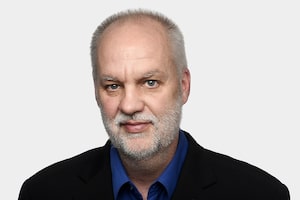President Joe Biden delivers remarks during the National Association of Counties Legislative Conference at the Washington Hilton hotel in Washington, on Feb. 12.TOM BRENNER/The New York Times News Service
“Well-meaning, elderly man with a poor memory.” With those seven nasty words, the oft-whispered question, “How old is too old to be president?” burst into the public sphere.
U.S. special prosecutor Robert Hur absolved U.S. President Joe Biden of criminal wrongdoing in his handling of classified documents, but did far more damage by implying that he was not fit for the job because, at 81, he is too old.
Never mind that his opponent, Donald Trump, a not-so-young lad of 77, is facing 91 felony charges and is a compulsive liar, among other things. As if fitness for high office depends more on age than honesty and sanity.
Such is the powerful punch that ageism packs.
What Mr. Biden is facing – insults, contempt and dismissiveness because of his age – is something elders know all too well. The assumptions about aging are as harmful as they are hurtful.
Look no further than the COVID-19 pandemic, when we treated elders as disposable, leading to a massacre of neglect in long-term care homes and an abominable death rate for elders in the community.
Asking if someone is fit for a job – be it a pilot, physician, professor or president – is a legitimate question. But age alone cannot be the measuring stick, not any more than gender, race or sexual orientation. Unfortunately, ageism remains the last acceptable prejudice.
But aging is not an illness. It’s a triumph.
People’s mental and physical acuity varies widely at all ages. We all decline as we age, but not at the same speed or in the same way. Mr. Hur, the special prosecutor, claimed that Mr. Biden suffered from “diminished faculties in advancing age.” A gratuitous insult.
A lawyer has no business making a medical diagnosis, especially in such a superficial way (based on some supposed lapses of memory), and in such a public manner. It comes across as nothing more than a partisan jab, and sadly, it has proven quite an effective one, largely because it confirms people’s prejudices about aging.
Sure, Mr. Biden is forgetful at times. He stumbles on words and has memory lapses. We all do. Nobody’s memory is perfect. It can be affected by multiple factors, including drugs, alcohol, lack of sleep and trauma.
As many media stories have noted in recent days, Mr. Trump makes just as many public gaffes. Again, that’s to be expected when someone is constantly in the public limelight.
Yet Mr. Trump had the unmitigated gall to say that Mr. Biden is unfit for office because he is “senile.” Senility is an outdated word for what we now call dementia: a loss of memory, language, and problem-solving skills that affects daily living.
To determine if someone is suffering cognitive impairment, or a serious neurological condition like Alzheimer’s, a battery of tests is required, beginning with a standardized test like the Montreal Cognitive Assessment (MoCA).
As far as we know, neither presidential candidate has undergone such testing. But they have both received clean bills of health from their physicians.
Again, a diagnosis should never be offered up outside a medical setting.
Some may be troubled by the notion of an octogenarian and septuagenarian vying for the presidency. Mr. Biden would be 86 at the end of another mandate, and Mr. Trump, 82.
But get used to it. Never-retiring is becoming increasingly common.
The reality is that society is aging, and so too is the work force – and workplaces need to adapt. That begins with dispensing with myths and stereotypes.
There is a widespread belief that older workers are more expensive than their younger counterparts; generally, that’s not true. Similarly, the belief that older workers are less productive or tech-phobic is false.
Much of the perceived slowness of older workers is offset by experience. Someone like Mr. Biden may walk and talk a little slower than at the start of their career, but you can’t discount the wisdom that has accumulated over decades.
An older brain is often a wiser brain.
Still, the “Are you too old for … ?” question resonates in deeply personal ways with many elders. It too often leads to self-doubt, dismissal and isolation.
With medical and social advances, we’ve done a tremendous job of getting people to old age. The large majority of elders live vibrant and busy lives, filled with mental and physical activity, work and volunteering.
Yet paradoxically, we still stigmatize and penalize people for being older, even when they hold some of the most powerful positions in the world.
 André Picard
André Picard